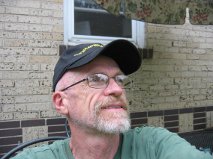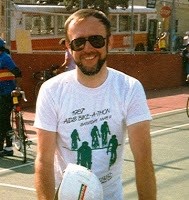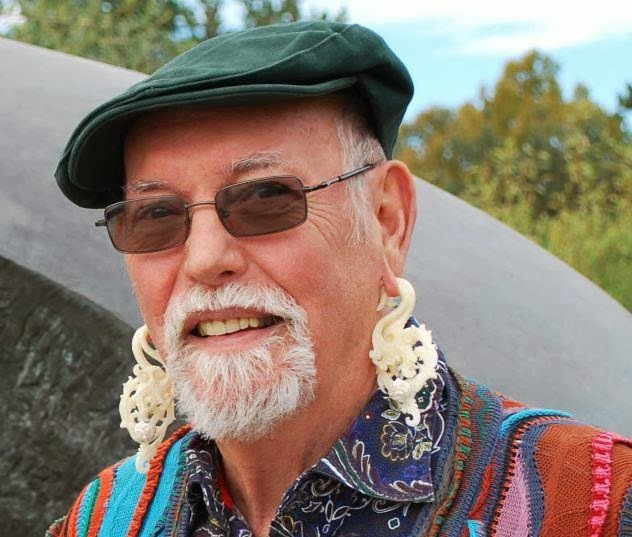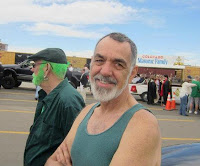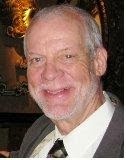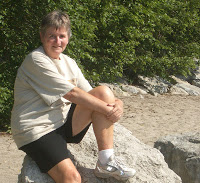I feel like the kid on the playground who feels left out, the one chosen last for a team, the one who has to read to the class but knows she won’t do well, the only one that doesn’t know Pig Latin. I feel like my father did when he picked up one of his grandsons at middle school. My nephew and a friend sat together in the back seat and talked with one another about their computers. Dad said he didn’t understand a thing they said for the duration of the twenty-minute drive home. I feel like I’ve fallen behind the whole world, sure I’d find questions on the current GED test incomprehensible. I feel like I’m falling off the grid. “Stop the world, I want to get off” captures some of my sentiment, but why this despair? I get around life just fine, enjoy reasonable work, nice enough friends, and occasionally even leadership. I’m not sure what I feel is despair, but I do feel pressures of a new job, one that I am interested to do but realize that it pushes me into a world of assumed knowledge that I don’t possess.
Computers are not new to me. In the late 1980s I met several PCs with their word processors. For ten years I successfully wrote book-length manuscripts using my PC WPs. To my family’s consternation, I’d tie up the home phone line in order to visit a friend’s bulletin board that gave me access to Shareware and some games. I heard the talk, appreciated the crude graphics, and came to appreciate the advantages my computer and word processor gave me. I enjoyed my experiments with Paint Brush and even tried my hand with some simple data bases.
I had bought the PC in order to write. I bought it at the suggestion of a writer and an editor, purchasing it at the outset of a project I had agreed to do and finished paying it off when I received my writer’s fee. I learned on the job by making mistake after mistake and solving the problems sometimes on my own, sometimes following the advice of others more experienced than I. So I learned to adopt my software and computer function with DOS smart commands, a few new programs, and several creative uses. I paid attention to what the computer needed and became at least moderately efficient in my applications. In the 1990s I entered a conversation—one of those on-line things now usually called a blog—one concerned with topics of professional interest; but I didn’t find the discussions all that interesting or pertinent. I think my life was changing too quickly, my interests moving towards the visual arts.
Still, I wrote. Still I maintained some records in a database. Still I experimented with Paint Brush. But most of my attention was focused on my art table with paper and ink, canvass and paint, design and technique. When my editors at the publishing house no longer could tolerate my antique technology, I got an Apple, then another more modern PC, and finally my PC laptop that went so fast I could never keep up. By then I had lost the curiosity factor. The WP was okay although not as convenient as the writers software I’d liked for years. Word for Windows didn’t thrill me. In fact, I never really got used to Windows. It seemed as if the attempt to make the computer more user-friendly just irritated me. I couldn’t see what was happening.
I believe my quick forays into Cyberspace were really the most intimidating factor, the ones that left me feeling like I wasn’t cutting it. I recall scares when my computer would start doing frightening things. I wondered would it die a cruel death? Explode into flames? I didn’t know but timidly accommodated myself to this unfriendly playground world.
Oh it’s gotten better for me in the 2000s. I am more at home, but suddenly I am working with “The SAGE Blog”—it always reminds me of the old movie “The Blob”—and threatens to engulf me, taking over my time and attention, and threatening to alter me in ways I don’t invite. I guess the problem is that the Blog is so social in its nature: its contributions, comments, and maintenance. I’ve always worked with people successfully, but now it seems too many of them are speaking Pig Latin or some other language I don’t easily understand. One very friendly and helpful techie said, “Well, Phillip, welcome to the cyber world.” But I’m not a techie or even a Treckie. I’m on a journey of learning but feel like I’m floating through this new, endless space with no thrusters. Still I am learning.
This in Pig Latin:
Omesay aysday Iway eelfay atthay Iway annotcay understandway atwhay isway expectedway ofway emay. Easeplay ebay atientpay. Iway aymay otnay understandway ethay echnicaltay eedsnay ofway ybercay ommunicationscay ellway, utbay Iway amway oingday ethay objay. Eoplepay owhay oday understandway areway akingmay itway appenhay inway itespay ofway ymay eeblefay attemptsway. Ifway ingsthay ogay ellway, ouyay ancay eginbay eadingray oriesstay onway ourway ownway ogblay extnay Ondaymay. Atwhay unfay itway illway ebay.
Quick; back to English.
Some days I feel that I cannot understand what is expected of me. Please be patient. I may not understand the technical needs of cyber communications well, but I am doing the job. People who do understand are making it happen in spite of my feeble attempts. If things go well, you can begin reading stories on our own blog next Monday. What fun it will be.
Again, thanks for your patience. I’m learning. Say a prayer or something for me that I will do the work well.
Note: This piece was read to the SAGE Telling Our Stories group at the end of September last year, just before this blog appeared. We’re celebrating the completion of our first year this month!
About the Author
Phillip Hoyle lives in Denver and spends his time writing, painting, giving massages, and socializing. His massage practice funds his other activities that keep him busy with groups of writers and artists, and folk with pains. Following thirty-two years in church work, he now focuses on creating beauty and ministering to the clients in his practice. He volunteers at The Center leading “Telling Your Story.”
He also blogs at artandmorebyphilhoyle.blogspot.com

